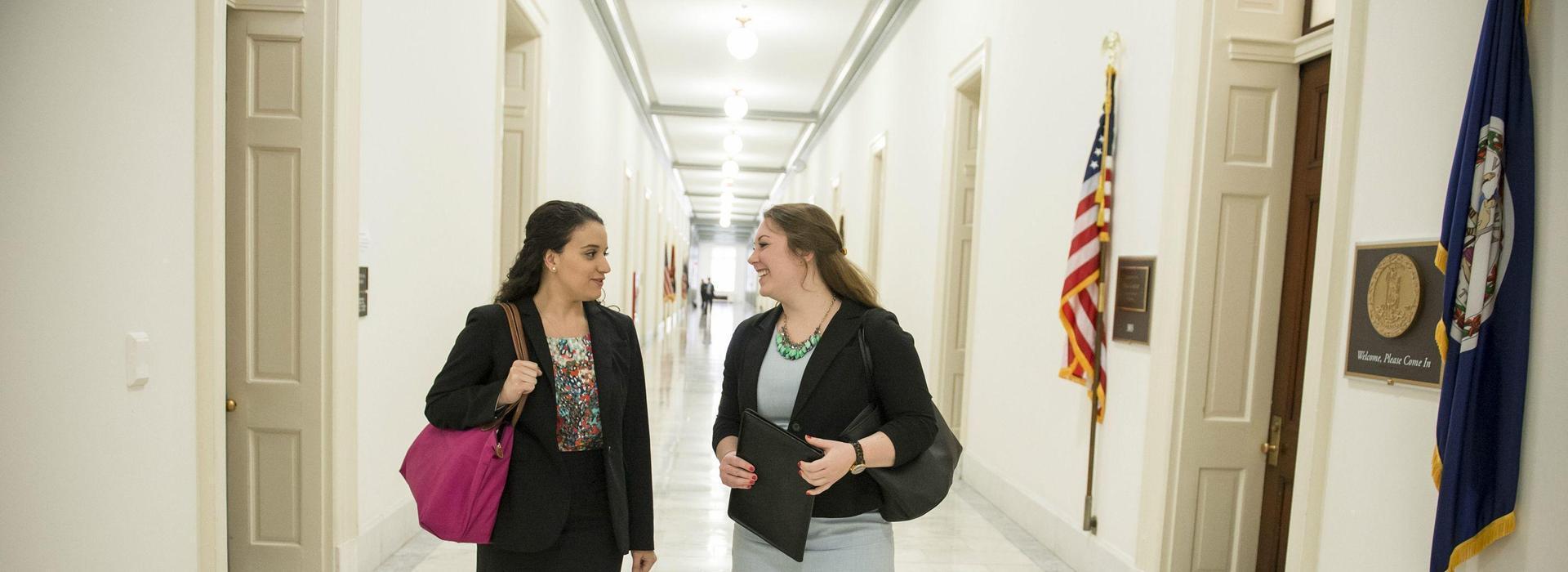


In 2020, AUWCL is implementing a pilot program through which students in corporate placements may receive academic credit and pay if the placement meets certain requirements.
Please click here for more information.
American University Washington College of Law, through the Externship Program, is excited to launch a new In-House Counsel Externship Program. This expansion of the law school’s successful Externship Program allows students to earn academic credit for their unpaid legal work in corporate settings.
This Program allows students to earn academic credit for unpaid legal work in private companies. Students may assist attorneys in such legal matters as regulatory compliance, legal risk management, intellectual property, employment law, securities filings, and commercial and government contracts. Students will gain invaluable lawyering experience as they gain first-hand knowledge working in the private sector.
During the fall and spring semesters students will extern 10-20 hours per week with companies located in the Washington DC area. During the summer semester (June and July) students will extern both locally and in offices across the United States and may work full-time.
We already have a number of large companies on board, and we hope to provide students with an array of choices that will allow them to get experience that aligns with their academic and career goals. Employers currently participating in our Program include Rosetta Stone, Chef’s Warehouse, Veriske 3E, CBS, Quest, Glatfelter Paper, IAP Worldwide, Aspect, and Quest.
Information about the Seminar:
Students may enroll in the In-House Counsel Externship Seminar when offered (Summer - Remote | Fall/Spring - In-person). The seminar will allow students to reflect on their experiences and their development in their field placement, learn concepts integral to corporate in-house counsel practice, discuss unique ethical concerns including issues of confidentiality, and develop professionalism skills. Students will draft legal documents and engage in negotiations. Faculty will be responsible for any grading associated with the program.
If the In-House Counsel Seminar is not offered, students may enroll in the 2-credit Externship Seminar. Please contact the externship program for more information.
For Employers:
The Department of Labor now allows unpaid internships with for-profit employers as long as the student is the “primary beneficiary.” Much of the test focuses on the extent to which the student is participating in an educational program, such as an Externship Program. See: DOL FLSA Fact Sheet #71.
Student Externship Hours: Externship Field Placement Employers (“Employers”) may set minimum hours requirements. During the fall and spring semesters, externs will be available to work in the Washington DC area between 10 and 20 hours per week. During the summer semester, externs may work full-time, in the DC area, nation-wide or overseas.
WCL Academic Calendar: Externships correspond to the WCL Academic Calendar. The fall semester begins at the end of August; the spring semester begins the second week of January. Our summer semester runs nine weeks – basically June and July. Some students being working the end of May through the first week of August.
Documentation: Employers are required to complete certain documents to help us ensure that externs are engaged in a substantive educational experience, and that the supervising attorney is providing regular feedback and supervision. These include the Externship Agreement, which lays out our school’s requirements and includes the extern’s anticipated responsibilities, and the Goals Form, a review of the extern’s mid-semester self-assessment, and a final evaluation.
Hiring Process: Although most employers prefer selecting their own externs, employers can let us know if they would like our involvement in the process. All postings will be advertised through the Externship Office and the Office of Career and Professional Development.
Pre-requisites: It is up to the employer to decide what pre-requisites are needed. Examples of specific course work could include Business Associations, Employment Law, Intellectual Property, etc. Specific course requirements may limit the number of applicants, as students who have only completed their first year of law school will be unlikely to have taken these courses and may not be eligible to apply.